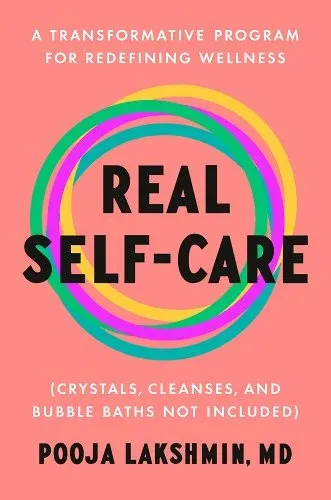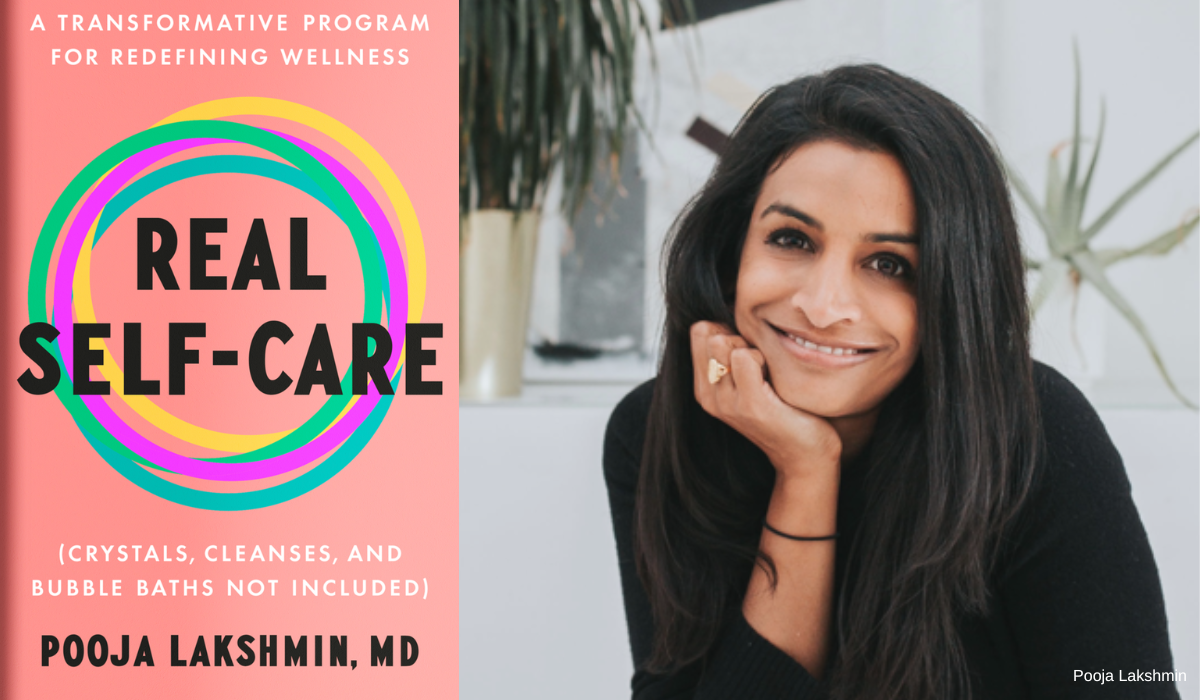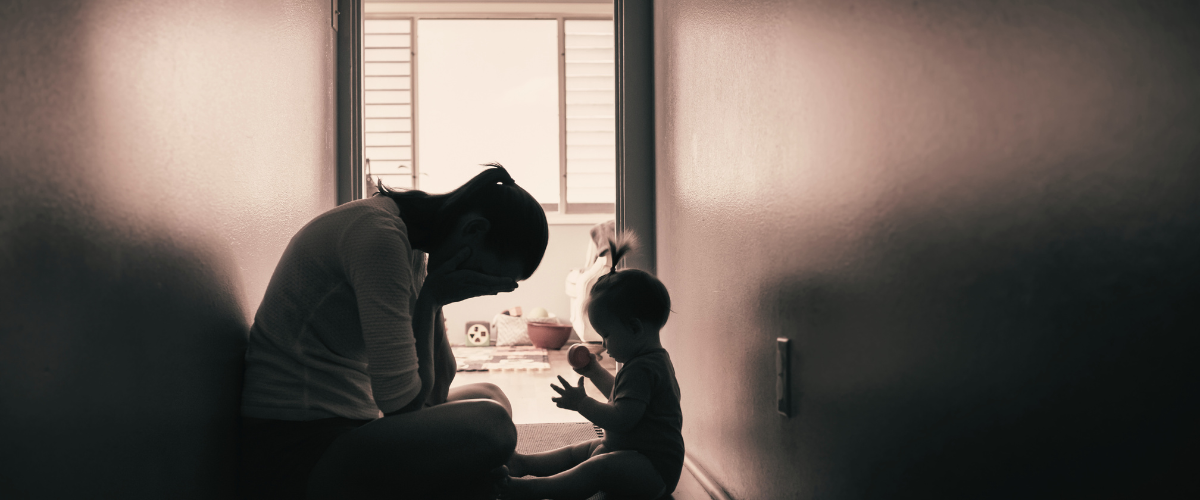True Self-Care Is an Inside Job—and Dr. Pooja Lakshmin Wants to Revolutionize How All of Us Think About It. Hint: It's Not a Bubble Bath
“I’m exhausted and overwhelmed, and I feel like it’s my fault because I’m not doing self-care.”
“I have three different meditation apps on my phone and never use any of them. What’s wrong with me?”
“I finally took an afternoon off from work, scheduled a $200 massage, and then spent the entire time thinking about my to-do list—and then beating myself up for thinking about my to-do list.”
Dr. Pooja Lakshmin can’t count the number of women who’ve told her some version of the above over the course of her 15-year career as a psychiatrist. She deeply understands these women who come to her because she is that woman—and she has the meditation apps and great-smelling bath salts to prove it.
“This is my beef with commodified wellness,” says Dr. Lakshmin. “So many of us are burnt out, not eating or sleeping well, and feeling like it’s our fault. Yet as moms and women, we don’t need another thing to feel bad about. Yes, we all need [self-care] methods. But the method doesn’t work unless you’re doing the internal work.”
In her new book, Real Self-Care, Dr. Lakshmin is on a mission to help us understand how to do that inner work—and why that is real, sustainable self-care.
The Sunday Paper sat down with Dr. Lakshmin to talk about why self-care as most of us know it is futile at best and dangerous at worst, how to manage the tricky stuff that’ll inevitably come up when we do the important yet difficult work of real self-care, and more.
A CONVERSATION WITH DR. POOJA LAKSHMIN, MD
You argue that so much self-care as we know it and strive for it these days is actually like a sugar high—an escape that in fact moves us further from our true selves. What do you mean by this?
Here’s an example that exemplifies the problem. (And to be fair, this is me, too.) You finally work up the nerve to take an afternoon off work and schedule a $200 massage. Then, you get there and spend the entire time on the table ruminating about your to-do list, then beating yourself up for wasting the massage because you’re stressed about your to-do list, then worrying your time off is going by too fast. Then you get back to your desk, and you’re stressed about being more productive to make up for the time you spent away from the office.
This encapsulates so much of what’s wrong with wellness.
We’re trying to employ a method, but what we actually need are principles. The massage, a yoga class, a meditation session—all of these methods can be great when used properly. But if you haven’t done the internal work, you won’t be able to receive the massage. You’re trying to do something external, but you haven’t made room for it internally.
Real self-care is the internal decision making that is threaded through every choice you make in your life. It’s not 15 minutes of stepping out for a meditation. Real self-care is in the how of how you show up to do your to-do list. It’s the way you show up to your free time with your kids. It’s the way in which you set up your weekly schedule, which relationships and activities you make time for and which ones you recognize aren’t serving you and then remove from your schedule.
These principles aren’t revolutionary, but they are hard to implement. The reason they’re hard is that all of these systems—the patriarchy, racism, end stage capitalism, all of the other isms—are working against your mental health. That’s a fact. So, our work—especially as women—is to understand that we’re constantly swimming upstream. It’s not your fault. It’s not that you’re trying hard enough. You’re swimming upstream.
That internal work can be difficult. Do you have advice for how to manage the tricky emotions that can surface when we get closer to ourselves?
I think the first thing to do is acknowledge that this stuff is tricky for a reason. It isn’t something that’s going to take a day, a week, or a month. It might take a couple years. Because when you’re in that place of burnout, there’s a fallacy that there’ll be one answer or thing to fix it all. But the truth is it’s hundreds of small things that help, not one thing. That dramatic one thing is usually not actually going to save you.
Doing this inner work is supposed to be hard and it’s supposed to take time. Changes that actually last tend to take time, with each small step getting you to the next step. You can’t leapfrog; when you do, it doesn’t last.
I also believe community helps. Being with other women, asking questions, thinking about time differently—it’s all so valuable. The process of grappling with these questions is where you’ll find your answers. Being in community with other people who are also trying to make sense of these things can be very supportive.
OK, so how can we tell if we’re engaging in self-care that’s actually helpful? Are there red flags we should be on the lookout for that can help us know when our self-care methods are doing more harm than good?
First, it’s important to note that you’ll inevitably fall into old habits because we’re all human. Plus, we’re in an ecosystem that’s forcing us in that direction. There will be nights where all you do is doom scroll, and you will spend $100 on a fancy face cream. It’s OK! We’re not aiming for austerity here. Real self-care is a practice. The practice is taking some time to look at the bigger perspective and patterns, reflect on those, and make decisions accordingly.
I’ll offer a couple red flags to watch out for. First, notice feelings of urgency. Are there pockets in your life where you feel like something has to happen right away—where the volume feels really high but what has to happen isn’t actually life or death? That’s a red flag that real self-care is needed. Second, get curious about what you are avoiding. Are there places in your life—situations, relationships, interactions—where you feel like it’s a mess and you don’t want to touch it?
Also, keep in mind I’m not suggesting you read this article or my book and do all of this at the same time. This work takes time. You have to come to this stuff in a really measured, intentional way.
Give yourself time to wrestle with you.
What do you hope readers will walk away with when they finish your book?
I want women to know that you can start doing this wherever you are, and that it’s never too late. Even if it feels like, Gosh, I don’t even have time to sit down and drink a cup of coffee while it’s still hot. How am I supposed to read a book? My answer is Yes, I know. Often it can feel like the solution is to run away from everything and make a dramatic change, but the answer really is in the everyday choices. Those are the most powerful solutions.

Dr. Pooja Lakshmin MD is a psychiatrist, the founder of the women's mental community centering equity, Gemma, and the author of Real Self-Care: A Transformative Program for Redefining Wellness (Crystals, Cleanses, and Bubble Baths Not Included) available this month in hardcover, e-book, and audiobook.
Question from the Editor: Have there been times in your life when you’ve turned to what Dr. Lakshmin calls “faux” self-care, expecting it to work when really, it just made you feel worse? How do you incorporate real self-care into your life?




